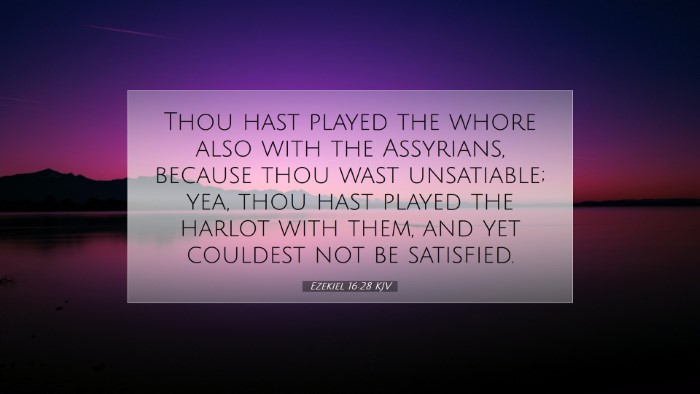Ezekiel 16:28 - Commentary and Insights
Verse Context: Ezekiel 16:28 states, "Thou hast played the whore also with the Assyrians, because thou wast insatiable; yea, thou hast played the harlot with them, and yet couldst not be satisfied." This verse is a part of a larger allegorical narrative in which God, through the prophet Ezekiel, addresses Jerusalem's unfaithfulness and idolatry.
Overview
The spiritual infidelity of Israel is a recurring theme in the prophetic literature, and Ezekiel is particularly vivid in his depiction. This verse highlights the insatiable desire of the people for foreign alliances and idolatries, contrasting their covenant relationship with God.
Commentary Insights
-
Matthew Henry's Commentary
Unfaithfulness to God: Henry articulates that the figurative language used in this passage denotes the deep-seated betrayal of Israel against God. The metaphorical "playing the whore" signifies not only spiritual adultery but also a direct appeal of God’s jealousy towards His unfaithful people.
Assyrian Influence: The reference to Assyria highlights the people's alliances with pagan nations. Henry notes that despite the pleas of the prophets urging them to return to God, Israel continued to seek fulfillment in their worldly relations, showing a pattern of dissatisfaction.
Insatiability of Sin: Henry points out the insatiability in their idolatry, illustrating how the pursuit of carnal desires leads to an endless cycle of betrayal and unfulfillment. Such is the nature of sin; it never satisfies and always demands more.
-
Albert Barnes' Notes
Historical Context: Barnes situates this verse within a historical framework, emphasizing how Israel’s alliances with surrounding nations, particularly Assyria, reflect a lack of faith in God's protection. The commentary suggests that these alliances were pursued as substitutes for God's sovereignty.
Spiritual Harloitry: He elaborates on the term "harlot," discussing how it symbolizes spiritual disloyalty as the nation worships foreign gods and engages in immoral practices, further straying from the righteous path God laid out for them.
Moral Lessons: Barnes also delves into practical applications, encouraging readers to examine their own lives for parallels and calling attention to the perils of seeking fulfillment outside of God’s covenant.
-
Adam Clarke’s Commentary
Relational Idolatry: Clarke elucidates that the harlotry mentioned is both relational and spiritual, suggesting that Israel’s entanglements with Assyria not only symbolize physical alliances but also an idolatrous relationship that leads her away from worshiping God.
The Nature of Desire: Clarke emphasizes the concept of insatiability, indicating that human desire apart from God leads to destruction. He notes that the more the Israelites "played the harlot," the less satisfied they became, illustrating a profound truth about the human condition.
Call to Repentance: Clarke concludes with a call to recognize one’s own “harlotries” and urges a return to true worship, exemplifying a pathway from spiritual despair back to divine grace.
Theological Reflections
This verse offers a rich ground for theological reflection on the nature of sin and the faithfulness of God. The metaphor of harlotry effectively conveys the deep relational rift that sin creates; it's not merely an act but a rejection of covenant love.
God’s Jealousy: The idea of divine jealousy found in this passage speaks to God's desire for an exclusive relationship with His people. It invites deeper consideration of the implications of idolatry in modern contexts where believers may be tempted to seek fulfillment in societal norms rather than in God’s commandments.
Pastoral Applications
For pastors and leaders within the church, Ezekiel 16:28 serves as a powerful reminder of the importance of guiding congregations toward fidelity in their relationship with God.
- Preaching Repentance: Emphasizing the need for repentance in the face of idolatry can encourage congregants to reflect upon their own lives and commitments.
- Teaching on Satisfaction in God: This passage can be used to teach the deep contentment that comes from a devoted relationship with God, striking against the notion that worldly pursuits can satisfy.
- Modeling Faithfulness: Pastors are called to model fidelity to God, demonstrating that true fulfillment comes through a devoted life rather than through unholy alliances.
Conclusion
Ezekiel 16:28, rich with imagery and theological significance, serves as a sobering reminder of the consequences of spiritual infidelity. Both historical and contemporary contexts underscore the enduring relevance of this warning. By drawing on the insights of past scholars like Matthew Henry, Albert Barnes, and Adam Clarke, pastors and theologians can delve deeper into the implications of this verse, challenging their communities to seek true satisfaction in their relationship with God.


